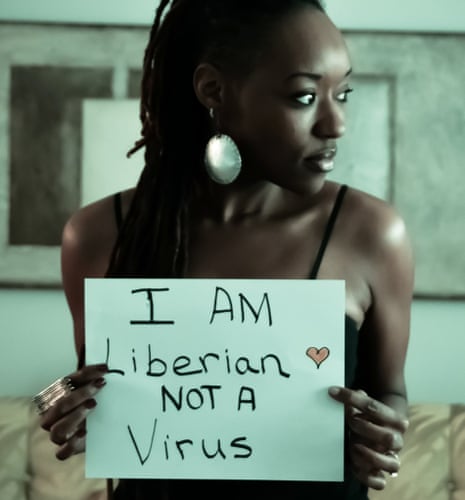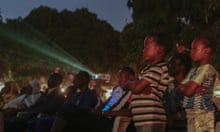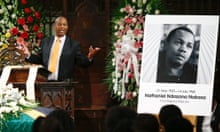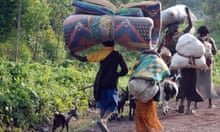“You’re from Liberia, so you have a disease”. When Shoana Solomon’s nine-year-old daughter came home from her American school and told her mother what her classmates were saying, Solomon knew there was trouble ahead.
Solomon, a photographer and TV presenter, moved her daughter to the US from a school in Liberia’s capital Monrovia in September. Despite coming from an Ebola zone, she says she was not subjected to any particular scrutiny upon arrival on American soil.
But as fear about Ebola mounts, Liberians in the US are increasingly finding themselves in a difficult position. With stigma and paranoia on the rise, Solomon has launched a campaign aimed at encouraging others to treat Liberians normally.
“The day after that happened to my daughter, I made a Facebook post,” Solomon told the Guardian. “I said, oh my goodness, my daughter’s being stigmatised. I said: Get ready.”
Wilhelmina from Myeonway Designs #IamALiberianNotAVirus #EbolaStigma pic.twitter.com/aP69efWih0
— Liberian Ent Awards (@LibEntAwards) October 14, 2014
The next day, Solomon received a phonecall from her sister, who lives in the US.
“Her daughter was in school and sneezed a couple of times. They took her temperature and placed her alone in a room, called my sister and said, given the situation...”
Solomon’s sister was asked to temporarily remove her daughter from school: a girl who has never been to Liberia, and has not had contact with anyone returning from Liberia for two years.
Solomon’s family are not alone. All over the US, Liberians are painfully experiencing what it means to come from a country so closely associated with the current Ebola outbreak. Late last week, a town hall meeting held in Staten Island, New York, brought together Liberians to denounce the stigmatising of their community. The Staten Island neighbourhood of Little Liberia is home to the largest population of Liberians outside Africa.
Outside the meeting, Liberian-American Charles Roberts told ABC News: “When they ask you where you come from and you say Liberia, then they turn their back on you.”
#iamaliberiannotavirus #ebolaisreal #Ebola pic.twitter.com/I1feSpsz7N
— Al Johnson (@libaljohnson) October 15, 2014
There have been reports of Liberians in Washington being instructed to temporarily leave work. “If I’m on the metro, I don’t talk,” Liberian writer Alphonso Toweh told the Washington Post. “If I’m on the bus, I don’t talk. If people hear the accent, they think you are Liberian, then you have Ebola.”
The death of Liberian Thomas Eric Duncan – the only person to die of Ebola on US soil – has fostered American suspicion of Liberians in particular. Solomon readily concedes, however, that the social stigma against Ebola exists as much within her own country as beyond its borders.
“Liberians stigmatise other Liberians,” she says. “It mostly affects those who have been cured – coming back into communities and not being accepted.”
Solomon says she understands the concerns of the US public.
“Don’t get me wrong: I’m afraid,” she says. “Ebola is a serious thing. I don’t want to minimise that. But there has to be some sensitivity. We have been through so much as a country: first our 14-year civil war, and now Ebola – the stigmatisation is just too much.”
As part of an awareness campaign conceived of by Solomon and three friends, a video has been released in which Solomon addresses the camera about the hurt felt by her daughter when accused of being a vector of disease.
“We didn’t bring this virus on ourselves,” she says, holding up a placard reading: “I am a Liberian, not a virus”.
Solomon describes the response to the campaign thus far as “awesome”. On Twitter, the slogan has since been adopted by other Liberians around the world, who have tweeted pictures of themselves holding up similar signs. A group of Liberian women staged a small march in Harlem, New York, on Sunday, carrying posters bearing the same slogan.
This article was amended on 22 October. It originally stated that only person to die from Ebola on US soil was Liberian-American, and named Thomas Edward Duncan. He was Liberian and named Thomas Eric Duncan.




Comments (…)
Sign in or create your Guardian account to join the discussion